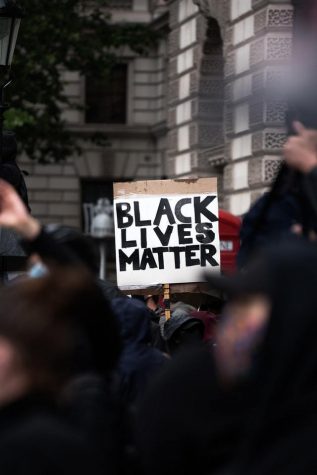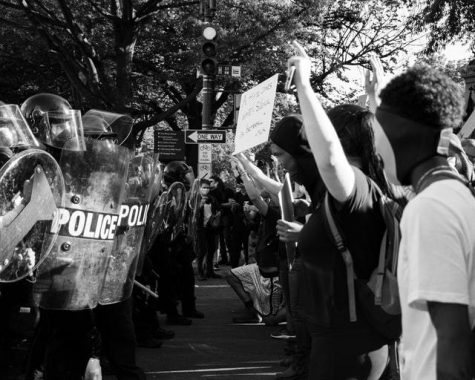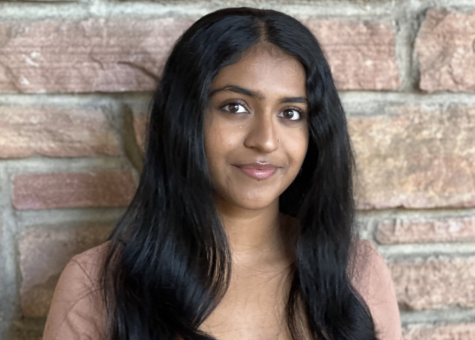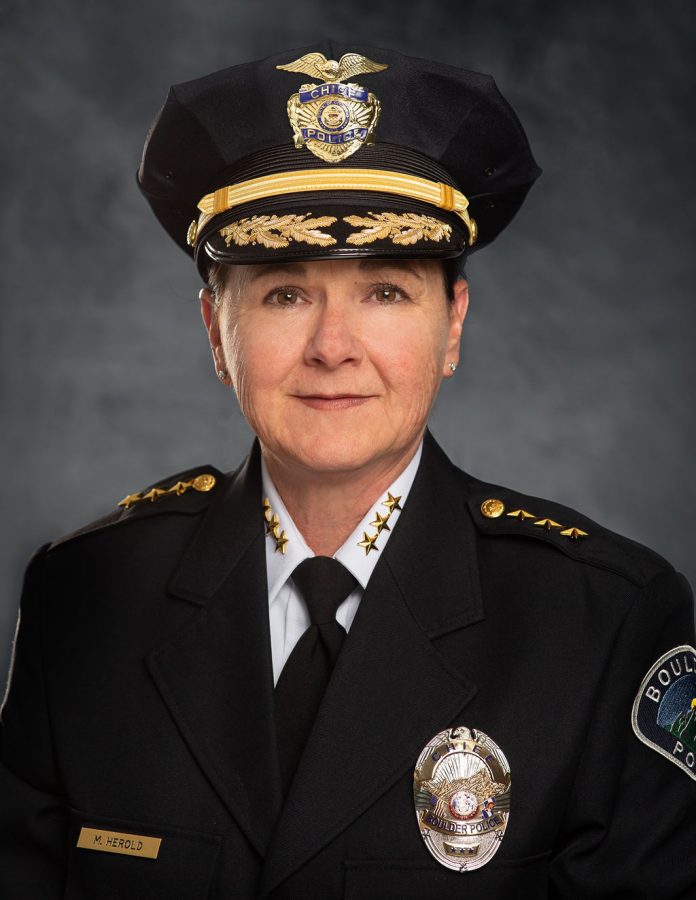What do the Boulder Police Think of Black Lives Matter?
Boulder’s Chief of Police Maris Herold is new to the Boulder Police but has been an officer for over three decades.
While 2020 has been a year of reinvention for some and loss for others, we can all agree it has been a year of change. This change ranges from the little things like staying at home and wearing a mask to bigger issues like the Black Lives Matter movement.
We’ve seen huge protests over the course of this year against incidents of police brutality and racially-motivated violence against Black people. Many police stations have been under scrutiny since then, and in the Boulder community, there have been a lot of concerns surrounding the police.
Recently, members of the Boulder community petitioned to eliminate the school resource officer program in BVSD. This was led locally by the NAACP whose efforts in Denver are already underway.
Chief Maris Herold has been with the Boulder Police since April of this year but has been an officer for three decades. I sat down with her to learn about the Boulder Police’s stance on the Black Lives Matter movement and how a resource officer removed from BVSD schools could impact the community.

On March 13, 2020, Breonna Taylor was shot in her Kentucky apartment. Shortly after on May 25, 2020, George Floyd was killed in Minneapolis. Last August, 23-year-old Elijah McClain was killed by officers in the Aurora Police Department here in Colorado. The news resurfaced around June 25 of this year and brought up many questions about the safety of our own local communities.
In June, prior to the news of McClain’s killing, the Boulder County Law Enforcement leaders released a statement in support of the Black Lives Matter movement in response to George Floyd’s death which read:
“The past week has been a difficult time for everyone. As leaders of the eight Boulder County law enforcement agencies and the District Attorney’s Office, we are deeply disturbed by the circumstances surrounding the death of George Floyd.
We have heard the words of the protestors. Black lives matter. That is true in Boulder County and everywhere in the world. Enough is enough. There is no room for any law enforcement professional who is biased against any group of people to be a part of our profession.
We stand in solidarity with you. When you are dealing with members of our organizations, we want you to feel safe, no matter your race, color, national origin, religion, sex, disability, age, sexual orientation, gender, or any other status. Should you find yourself speaking with a law enforcement officer or deputy, you should not have to fear for your life or suffer any discrimination.
In Boulder County, we must continue to make progress in improving our justice system — but there is work that remains to be done. To truly honor George Floyd requires we do so. Law enforcement and the community must work together to make changes which will solidify trust and ensure a justice system that is fair for all. We are and will continue our commitment to find ways to do better as a community.
We, the leadership of all of the Boulder County law enforcement agencies and the District Attorney’s Office, make this promise to our community; we will not stop until members of our community no longer fear those who are there to protect them.”
The Boulder County Sheriff, as well as the Erie, Boulder, Lafayette, Longmont, Louisville, Nederland and the University of Colorado Police Departments (Boulder County Law Enforcement leaders), issued this statement collectively. As a student in Boulder, I wanted assurance that the words in this statement were true. “I like to think of the police as just a branch of the community and I think that the best way for the community to feel safe is to work in partnership on policing issues in the City of Boulder,” said Chief Herold. “We’re very transparent about what crimes are being committed and where. We have a very good public information officer that tries to get real-time information out to the community.”
The Boulder Police Department has a mobile app that provides breaking news, allows citizens to file a police report, request crime reports and file an employee complaint or commendation. In addition to keeping the public in the loop, Chief Herold believes that working together as a community is the best way to stay true to this message. “When you share with the community where you have chronic problems and issues, and you work together on them, I think the community feels safer, the police department engages on a higher level with the community members, and it’s how we get to know each other as people, which makes policing better in the future. I just want the community in Boulder to know that this police department is above the curve as far as the training we’ve offered, the co-response, the civilians that we have working on mental health issues, on homelessness issues. They want to be helpful, they want to help the community. It’s a good police department.”

Living in a state where we see examples of bad policing, like Elijah McClain’s case in Aurora, understanding how the Boulder Police function compared to the Aurora Police Department is important to the overall safety of our community. “I’d like to think that we’re ahead of the curve compared to most police departments across Colorado,” said Chief Herold. “I come from a reformed background, so I think we took an aggressive stance on police reform and I think the police department generally is working on the use of force investigations and citizens’ complaints investigations. [We are a] very well-educated department. This is important to police reform.”
To become an officer in Boulder, you must have an Associate of Arts (AA) degree, and before you are promoted to a Sergeant or supervisor you must have a Bachelor’s degree, which a lot of departments don’t mandate. About one-third (30.2 percent) of police officers in the United States have a four-year college degree and a little more than half (51.8 percent) have a two-year degree, while 5.4 percent have a graduate degree (as of 2016). Chief Herold also added that many of her officers have combined their degrees with military experience or graduate or graduate degrees, which gives them an advantage. “I can tell you that I have doctors, I have attorneys, engineers, flight medics, war heroes. I have the whole gambit of education which really is an implication that this is a police department that is worldly, that has experience with diverse cultures and people and I wish we would mandate that on a national level.”
The Black Lives Matter movement has brought up a wave of change, causing many police departments nationwide to check themselves against the guilty departments that have been put in the spotlight along with one question: How do we change this pattern? Chief Herold believes that fixing tactics is the way to go. “When you’re looking at these instances around the country where we’ve had civil unrest, the police have made really bad tactical mistakes. I think that if you’re really interested in making the police better, we have to be innovative and we have to train police officers more.” To further her point, she pointed out what her own department has done. “Since my short time in Boulder, I’m very impressed with the education level of the officers and their ability to want to engage with the community and they want to take on more challenging training. I think the city of Boulder is in very good shape as far as their police department and I really think the vast majority of officers want to do great things.”
Zoning back in on our local BHS community, the focus is on school resource officers. The school resource officers are responsible for working with school administrators, security staff and faculty on “developing comprehensive safety plans to ensure schools are safe places away from threats for students to learn.” A few years ago, this definition would’ve been accurate to anyone who read it, but recently, the Black Lives Matter movement and the NAACP have brought up a question: What if the resource officer is the threat?
It’s a controversial topic. On one hand, this is a completely valid question considering that a huge portion of students in the U.S. are Black and a school resource officer could be a potential threat to these students. On the other hand, many people argue that a school resource officer is a comforting figure to many students and parents in the case of events such as school shootings. The most common solution to any problem is a compromise.
But what is this compromise and how can we ensure our safety? “Where I come from in Cincinnati, there’s a lot of school violence. There’s always the threat of school shootings at some of the high schools,” says Chief Herold. “We have police officers in middle schools, and I do think there is a need for constant and thoughtful conversation about the high schools and the need for some type of policing in the high schools so I hope those conversations continue. Right now we are in a national policing crisis and I think we just have to be very thoughtful about where our resources are being used. Let’s face it: we’re living in a world where we have to worry about guns on the street and violence, and so I think there’s always a need for close collaboration and partnerships with our schools.”
To get more insight into this issue, I approached Boulder High principal Dr. James Hill for his take on the issue, since he is an advocate for both sides of this debate. “I think what’s important is the safety and welfare of our students both in the physical standpoint and mental,” said Dr. Hill. “Whether that’s having a police officer in the building or not, and we can debate that, but what I’m saying is that’s what’s important.” Dr. Hill has put an emphasis on the community and what’s best for everyone in it. Whether that is with or without a school officer, there are consequences and risks. “We need to have the policy to ask, ‘What are we going to do to ensure their safety?’ And if there’s no answer to that, then we have a bigger issue.” The importance of asking this question is to accommodate all students’ needs. “At the end of the day, without a resource officer, what’s going to be our response to an outside threat coming in? If we have people that are triggered by police presence in the building, what are we going to do about that? We can’t just remove one thing and say that’ll solve all our problems. Anytime you remove something, there’s a void.”
Along with school resource officer changes, Dr. Hill believes that members of the school community can also change. “Something that teachers, students, administrators, and police officers need is cultural sensitivity training. You can never have enough training for that, and I know that’s lacking. Learning about the people your serving and interacting with is important. How much is focused on learning about differences, cultures, and diversity that you may not be familiar with? If you know, then chances are your response is going to be different to something you’re not familiar with. Everyone needs that.”
Change is inevitable, but its course can be altered when it comes to the outcome of this election. Some may say that the future of the Black Lives Matter movement and everything that it impacts is in the hands of voters. This means that the fate of police departments are also in the hands of this election. “We are not receiving the national support that policing once did as far as innovations in policing,” said Chief Herold, “and I think that if we’re going to change policing, we have to do it on a national level. Other presidents have done a really good job with that. If you look at President Barack Obama’s stance on 21st century policing, I think he tried to get to the big ideas in policing—technology, science, education [and] new standards for training. He began that journey, I just think that he didn’t get a chance to complete some of his work.” Chief Herold believes that the right way to go is by bringing in more technology, understanding the principles of crime science which “has to be a part of any solution”, and moving forward, having a national police academy where “we recruit people that want to be service driven and want help to protect all people and help solve problems. That is what’s going to be the future of policing.”
Over the past few months, the Black Lives Matter movement has brought forth many changes already, and one can only hope that the protests will end in equality and justice. “Change is going to happen,” said Dr. Hill as he explained his hope for the future. “It’s really up to our community, but it depends on the approach, it could either get worse or get better. We need to ensure that we’re having those critical conversations. And we need to respect each other to ensure that we’re furthering change in the right direction.” Chief Herold’s hope is that everyone is “kind to each other, wanting to compromise, educating yourself to each other’s perspectives, and compromise isn’t a bad word. It’s something that we do to make the country better and to make policing better, and really understanding the issues in policing and not just having knee-jerk reactions to things that you think you understand.”
There are many ways the next years to come can go but in a world filled with so many opportunities to change things, it’s good to know there’s still hope that the future will be better because we can be better. As Mahatma Gandhi said, “Be the change you wish to see in the world.”

Saisree is a senior who enjoys interviewing and featuring people at any chance. Since the age of 10, when she wrote an article about Will Smith using a discussion that had never happened, she knew she eventually wanted to interview people. Apart from Newspaper, Saisree enjoys taking contesting courses that she prays she will do well in just for a challenge. She is particularly interested in biotechnology and how it will either benefit or end the human race. She is an artistic person, very much in tune with her culture, and does Indian classical dance, violin, and vocals. To power the force Saisree attempts to be, she relies solely on purple grapes because they are higher in antioxidants and protect...




valsa kumar • Oct 23, 2020 at 11:17 pm
very well written everyone has the right to live a decent life.The police should safe gaurd every ones lives .congratulations to the writer